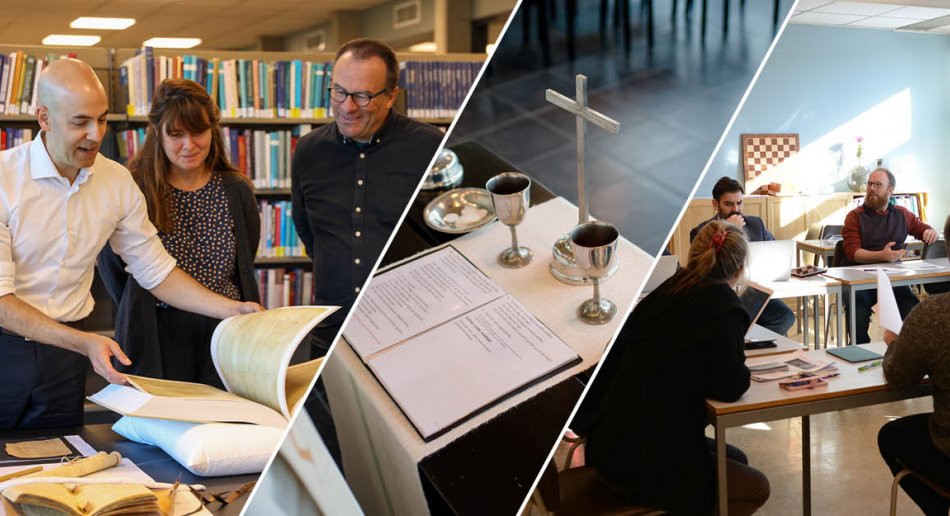
Doctoral Degree Programme
Study info
- Location: Majorstuen
- Duration: 3 years
- Credits: 180
- Start semester: Autumn and spring
MF Norwegian School of Theology, Religion and Society offers a Doctoral Program (PhD) that qualifies you for teaching at the college/university level, research activities, and other work with high standards of scholarly insight, skill, and well-developed analytical thinking.
Our PhD programme aims to train researchers with expertise in the scholarly analysis and the formation of hypotheses and theories.
Fields of Research at MF
MF’s research is centered around the fields of Theology, Religion, and Society, including disciplines such as:
- The Old Testament/Hebrew Bible (OT/HB)
- The New Testament (NT)
- Church History and Cultural History
- Systematic Theology
- Ecumenism
- Ethics
- Practical Theology
- Diakonia
- Religious Education
- Religious Studies
- Sociology of Religion
- Psychology of Religion
- Existential Psychology
- Social Sciences
- Missiology
Pathways to the PhD programme at MF
There are three alternatives for admission to the PhD programme:
1. Application for a Doctoral Research Fellowship
MF regularly advertises Doctoral Research Fellowship positions. An application for such a position is to be submitted through the application portal JobbNorge. Applicants employed as Research Fellows will automatically be enrolled in the PhD programme.
2. Application for admission to the PhD programme
Twice a year, applicants who seek to complete a PhD with full funding from their employer, or who can otherwise demonstrate sufficient self-funding to undertake a PhD project, may apply for admission. The application deadlines are 1 March and 1 October, and applications are submitted through MF’s Søknadsweb.
3. Application for a collaborative PhD
In some cases, MF may enter into an agreement for a PhD project to be completed as an institutional collaboration, wherein salary expenses are shared between MF and the PhD candidate’s own workplace, institution or organisation. Requests for such a PhD project should be directed to the Prorector. Admission to the programme is otherwise conducted in the same manner as outlined in point 2 above. When a proposed project is accepted, a separate institutional collaboration agreement is drafted, in addition to the standard PhD agreement.
Regardless of how admission takes place, a well-developed project description is essential, as it forms the basis for admission. The project description will undergo an academic assessment before it is sent for deliberation by MF’s Research Committee.
More information about the PhD Programme
Listen to the course in application writing for potential Ph.D. Applicants (audio only):
About the study
Application
Applications may be submitted twice a year.
The application portal (Søknadsweb) opens on 1 February/ 1 September.
- The application deadline is 1 March/1 October.
- The start of studies is 1 September/1 January.
If you are an international applicant without BankID, please see Application and admission for instructions on how to apply.
MF's programme is open to applicants from other universities and colleges in Norway and abroad. Students in the PhD programme must attend mandatory teaching for the coursework, 50% and 90% seminars, and public defense at MF (Oslo, Norway). Exceptions may be granted for digital attendance.
Admission requirements
In order to be admitted to the PhD programme, you must
- have completed at least five years of higher education, and received a master’s/cand.theol. degree or equivalent in a relevant subject area. The master’s degree should include a written thesis of minimum 30 ECTS credits and be graded B (or equivalent) or better.
- submit a project description in line with MF's template for project descriptions.
- submit documentation of finances/external funding for the PhD period and project.
In cases where the applicant does not meet the grade requirement or does not have a master's degree, but is clearly qualified, the Research Committee can consider the application on an individual basis.
Required documents
- Application form
Applicants must fill out the application form and upload it as a pdf-file in Søknadsweb.
- Educational background
Relevant degrees from institutions of higher education must be documented by uploading copies of the original diploma, transcript of records, and diploma supplement. If any of these documents are not originally in English or a Nordic language, an official translation must accompany the copies of the original documents.
- Finances/Funding
Applicants who have external funding for their PhD, for example through their current employer, grants, or scholarships, must provide documentation of this.
Applicants who plan to finance their PhD with private funds, must provide a statement addressing how they plan to finance their PhD period and project.
- Project description
Applicants must upload a fully developed project proposal in line with MF's template for project descriptions.
- CV (curriculum vitae)
The CV should include references.
- List of publications (if any)
Programme structure
There are three different programme structures offered depending on the method used in the PhD project. Please see your supervisor and/or the PhD coordinator for help in setting up your plan.
Programme structure with historical and exegetical methods:
| PHD950 PhD Thesis 150 ECTS | ||
| PHD929 90% seminar | ||
| PHD930 The Status of the Discipline 10 ECTS | ||
| PHD925 50% seminar | ||
| Offered in spring semesters: | MET-HIS910 Historical and Exegetical Methods: Text, Materiality, Context 5 ECTS | MET-HIS920 Historical and Exegetical Methods: Sources, Text-Production and Transmission 5 ECTS |
| Offered in autumn semesters: | PHD901 Theory of Science and Research Ethics 5 ECTS | PHD902 Theory of Science 5 ECTS |
Programme structure with methods in systematic theology:
| PHD950 PhD Thesis 150 ECTS | ||
| PHD929 90% seminar | ||
| PHD930 The Status of the Discipline 10 ECTS | ||
| PHD925 50% seminar | ||
| Offered in spring semesters: | MET-SYS910 Methods in Systematic Theology: Hermeneutics, Dogmatics, and Ethics 5 ECTS | MET-SYS920 Methods in Systematic Theology: Philosophy and Theology 5 ECTS |
| Offered in autumn semesters: | PHD901 Theory of Science and Research Ethics 5 ECTS | PHD902 Theory of Science 5 ECTS |
Programme structure with qualitative and quantitative methods:
| PHD950 PhD Thesis 150 ECTS | ||
| PHD929 90% seminar | ||
| PHD930 The Status of the Discipline 10 ECTS | ||
| PHD925 50% seminar | ||
| Offered in autumn semesters: | MET-EMP910 Research Design and Qualitative Methods 5 ECTS | MET-EMP920 Qualitative Methods: Analysis and Writing 5 ECTS |
| Offered in autumn semesters: | PHD901 Theory of Science and Research Ethics 5 ECTS | PHD902 Theory of Science 5 ECTS |
Method of instruction
Method of instruction
Whereas the PhD program aims at individual and specialised studies, the quality of such studies also depends on participating in a research community where topics and problems are discussed in courses where other students participate. These courses are structured around four areas:
- Philosophy of science (10 ECTS)
- Methodology (10 ECTS)
- The Status of the discipline (10 ECTS)
- Thesis (150 ECTS)
Specialists in their field teach all courses. The format consists of lectures, panels of responses and discussions, seminars, and work groups. Some seminars are offered in cooperation with other (national or international) institutions. The literature for each course should generally be read before the seminar starts.
The different parts of the coursework provide the opportunity for a hermeneutical interplay, by which the Candidate becomes skilled in understanding the context of their research. The work on the PhD thesis nevertheless constitutes the major part of the program work. (150ECTS). The course components support, inform, guide, and inspire the individual research project of the candidate, but some of the coursework contents also provide a broader context of knowledge than what is required for the thesis. Hence, the program educates for research in general, as well.
1 ECTS (= European Credit Transfer System, ’studiepoeng’) requires 25-30 hours of work from the candidate.
Philosophy of science (10 ECTS)
Two courses are required on this topic. The fundamental perspectives in these courses place the PhD specialisation and the PhD thesis within the context of scholarly work, and the students can develop their understanding and be enabled to document the larger horizon within which the research takes part.
PHD901 (5 ECTS) and PHD902 are mandatory for all students. These courses focus on fundamental questions in the study of and research on Religion and Values.
Methodology (10 ECTS)
Two courses are required on this topic: MET910 (5 ECTS) and MET920 (5 ECTS). The courses focus on methodological issues and train students to discern, choose and employ proper scientific/scholarly methods. Two courses are offered in each of the following fields:
A. History and exegesis
B. Systematic Theology
C. Social sciences and empirical research
The student normally takes both courses from either A, B or C, but combinations may be granted by application.
PHD930 The Status of the Discipline (10 ECTS)
This course aims to give a thorough understanding of the present stand and status of the discipline. To achieve this, the student participates in activities relevant to the thesis topic. The course requires participation in two international conferences or an academic stay abroad. In addition, involvement in Research groups, seminars, or complete courses from Research Schools may be considered fulfilling part of the course requirements.
PHD950 Thesis (150 ECTS)
The central part of the program is the writing of the thesis. The thesis may consist of a single work or several shorter works with an extensive introduction. Research seminars are offered regularly, and students must attend and present their work in these.
Equivalation
By application, equivalent courses may be accepted to fulfil the program.
Learning outcome
Learning outcome
The aims of the PhD program can be described as follows:
Knowledge
The candidate
- is at the forefront of knowledge within their academic field and masters the field’s philosophy of science and relevant methods.
- can evaluate the expediency and application of different methods and processes in research and scholarly development projects.
- can contribute to developing new knowledge, new theories, methods, interpretations, and forms of documentation in the field.
Skills
The candidate
- can formulate problems, plan and carry out research and scholarly development work.
- can carry out research and scholarly research work of a high international standard.
- can handle complex academic issues and challenge established knowledge and practice in the field.
General competence
The candidate
- can identify relevant ethical issues and carry out research with scholarly integrity.
- can communicate research and development work through recognised Norwegian and international channels.
- can participate in international scholarly discussions.
The totality of the qualifications acquired is assessed at the end of the PhD programme. When the coursework is completed, the successful defense of the PhD thesis and the trial lecture indicates that the qualifications are achieved).
After reworking, the final version of the course paper should be sent to the responsible course convener for final approval, usually within three weeks after the course. It will be subject to the exam that term.
Papers are approved by the course convener(s) or the supervisor(s). The courses are graded passed/failed based on fulfilled course requirements

